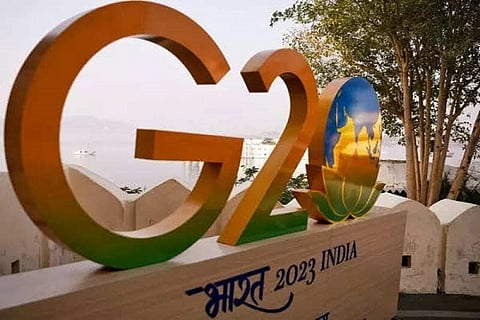
- News Updates
- PSU Watch
- Defence News
- Policy Watch
- हिन्दी न्यूज़
- Jobs Watch
- States News
- Event News

New Delhi: The G20 Energy Transitions Ministers’ meeting concluded with an outcome document instead of a final communique. The document released at the end of the two-day-long meeting called for a ‘phase down’ of unabated use of fossil fuels and accepted low-emission hydrogen along with green. The meeting ended on July 21. And a final communique was not released as Russia and China differed from the rest of the member countries on the issue of Russia-Ukraine war. “Russia recognises the status of this document as Chair’s Summary in particular due to the inclusion of Paragraph 27 (on Russia-Ukraine war), in addition to paragraphs 21-26. Russia agrees with rest of the text. Russia has expressed its distinct view on the situation in Ukraine, geopolitical tensions and sanctions during the meeting. China stated that G20 is not the right platform to address security issues and opposed the inclusion of the geopolitical related content,” said the document.
Paragraph 27 of the document read, “Most members strongly condemned the war in Ukraine and stressed it is causing immense human suffering and exacerbating existing fragilities in the global economy – constraining growth, increasing inflation, disrupting supply chains, heightening energy and food insecurity, and elevating financial stability risks. There were other views and different assessments of the situation and sanctions. Recognising that the G20 is not the forum to resolve security issues, we acknowledge that security issues can have significant consequences for the global economy.”
“Given that fossil fuels currently continue to play a significant role in the global energy mix, eradication of energy poverty, and in meeting the growing energy demand, the importance of making efforts towards phase down of unabated fossil fuels, in line with different national circumstances was emphasised by some members while others had different views on the matter that abatement and removal technologies will address such concerns,” said the summary document.
“We firmly believe that energy security, energy access, market stability, and energy affordability need to be advanced simultaneously while advancing energy transitions, in pursuit of economic growth and prosperity, and ensuring access to modern energy for all, leaving no one behind,” it said.
“We aim to support acceleration of production, utilisation, as well as the development of transparent and resilient global markets for hydrogen produced from zero and low emission technologies and its derivatives such as ammonia by developing voluntary and mutually agreed harmonizing standards as well as mutually recognized, and interoperable certification schemes,” said the document.
Commenting on sustainable biofuels, the document took “note of the Presidency’s initiative to establish a ‘Global Biofuels Alliance.”’
Acknowledging that certain minerals, materials and technologies are critical for energy transitions, the G20 member countries stressed on the “need to maintain reliable, responsible and sustainable supply chains of such critical minerals and materials, as well as semiconductors and related technologies complying with the principles of market economy and international trade rules while respecting the sovereign rights of countries.”
“We also recognise the role of grid interconnections, resilient energy infrastructure and regional/cross-border power systems integration, where applicable, in enhancing energy security, fostering economic growth, and facilitating universal energy access for all, in affordable, reliable and sustainable manner,” said the document.
G20 agreed to work towards facilitating access to low-cost finance for existing as well as new and emerging clean and sustainable energy technologies for supporting the energy transitions. “We reiterate that access to low-cost financing, particularly for developing countries, is pivotal for accelerating the efforts towards energy transitions while ensuring energy access, energy security, affordability and market stability,” it said.
“We highlight that access to affordable, reliable, sustainable and modern energy for all is a moral imperative and a basic human need. We intend to expand on the achievements of previous G20 Presidencies and prioritize and take actions to pursue our shared objectives of attaining SDG7 targets through enhancing international cooperation and investment in technologies and accelerating progress on clean cooking, electricity access and eradicating energy poverty. We commit to provide support for all sections of society to ensure that no one is left behind,” it said.
“We strive to strengthen global efforts on energy efficiency through international engagements such as the G20 Energy Efficiency Leading Programme (EELP), Energy Efficiency Hub, Clean Energy Ministerial (CEM), among others,” said the document, adding that the G20 bloc has taken note of the Voluntary Action Plan for doubling the rate of energy efficiency by 2030 prepared by India.
(PSU Watch– India's Business News centre that places the spotlight on PSUs, Bureaucracy, Defence and Public Policy is now on Google News. Click here to follow. Also, join PSU Watch Channel in your Telegram. You may also follow us on Twitter here and stay updated.)
